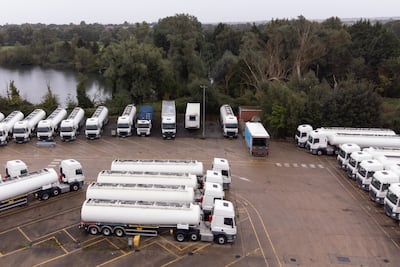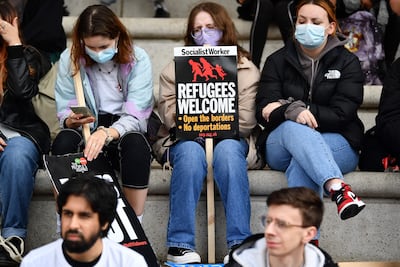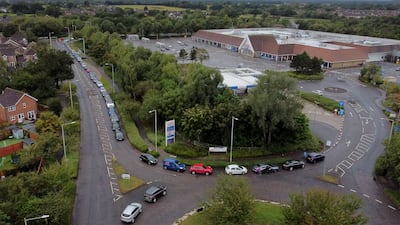Boris Johnson is a busy man. According to British newspapers the Prime Minister is going to “Save Christmas” for the second year in a row. In 2020, Mr Johnson announced he would “Save Christmas” from coronavirus by relaxing restrictions. The result was a big increase in British infections and deaths.
This year, Mr Johnson is “saving Christmas” from his own government’s policies, notably Brexit, although that is not how he puts it. “Brexit” in British government circles is like “Voldemort” in the Harry Potter series, something which must not be named.
Others are not so reticent. A Dutch newspaper cartoon shows Mr Johnson struggling to tow a broken down Brexit “Global Britain” truck. The New York Times summed up a catalogue of Britain’s wounds, some Brexit related: "Long lines outside gas stations. Panicked drivers fighting one another as the pumps run dry. Soldiers deployed to distribute fuel across the country. And in the background, the pandemic stretching on, food rotting in fields and families sinking into poverty.” And Finland’s former prime minister, and friend of Britain, Alexander Stubb tweeted: “Reading news about petrol shortages and other supply problems in the UK. Really sad to see what Brexit is doing to a country that used to be great. Brexit is the biggest mistake a modern nation state has inflicted on itself in recent history. Hope to see an end to this mess.”
It is difficult to explain how the UK, a creative, competent, beautiful country, has descended into such a pit of doom, but I’ll start with my neighbour Colin. He texted me just over a week ago to say that there was no fuel at our local filling station. Then in a local park, a stranger called out to a group of people getting ready to play tennis that there now were so many cars trying to get petrol that the nearby main road was blocked in both directions and police officers were trying to restore order. Newspapers and social media highlighted empty supermarket shelves, while British government ministers announced there really was “no need for panic buying”. As the British satirical magazine Private Eye put it, this was “panic lying.”
Faced with shortages of key resources, millions of people (me included), tried to secure the fuel we need to get to work or take our children to school.
Truth and common sense are also in short supply. British government ministers insisted there was no shortage of fuel, because there was plenty at the main depots, just not enough where motorists actually could buy it, in filling stations. The fact is there is a shortage of drivers for Heavy Goods Vehicles (HGV). Again Mr Johnson’s spokesmen have been less than honest in suggesting this shortage has little or nothing to do with Brexit, especially since their solution to the problem is to offer limited visas for EU drivers to come to the UK.
There is indeed a shortage of HGV drivers across Europe, but post-Brexit Britain is particularly badly hit. There is a tsunami of problems here caused by labour shortages in many industries as a direct result of EU workers leaving Britain. Throughout the summer farmers have complained that crops have rotted in fields because there are not enough foreign workers to pick them. British meat processing factories now report an acute shortage of butchers and others prepared to work in slaughterhouses. Turkey farmers say – rather like an echo of the fuel problems – that there are plenty of turkeys in Britain, but not enough workers who can get them ready for British Christmas dinner tables.


Romanians, Estonians, Poles and others who used to fill many of these generally low paid jobs have felt unwelcome in Britain, unable to get visas and have also seen the value of the pound drop. That means the value of their take home pay in the UK has fallen when they convert it into euros. And for those Britons trying to escape the misery and the post-Brexit shortages, the TV presenter Kay Burley photographed two scenes when she arrived at a Portuguese airport. One was an empty hall for arrivals from the EU who speed through border checks. The other showed hundreds of British passport holders queueing up to be processed as a result of the new post Brexit border controls.
The Johnson government and Brexit-supporting newspapers maintain the pretence that all these long predicted post-Brexit problems have nothing much to do with Brexit. Our own eyes and common sense say something very different. No other European country is experiencing the chaos that post-Brexit Britain is suffering. Northern Ireland, a part of the UK, has not been affected because under the Brexit agreement there is a protocol which treats Northern Ireland in some respects almost as part of the EU. Lucky them. And while Boris Johnson addresses his Conservative party’s annual conference in Manchester this week, the truly damaging shortage is his lack of honesty about why we are in such a mess.


